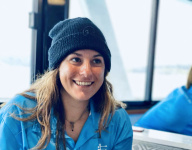

Martina Lonati
martina.lonati@my.jcu.edu.au
Recipient of an AIMS@JCU Scholarship
Masters by Research
College of Science and Engineering

Martina Lonati
martina.lonati@my.jcu.edu.au
Masters by Research
College of Science and Engineering
Sharks in time: investigating the implications of time on sampling methods for shark research.
Martina grew up in Italy, sailing the Mediterranean Sea for most of her childhood. She moved to Australia and started a Bachelors degree at James Cook University to pursue a research career in Marine Biology, mainly focusing on shark fisheries, shark conservation and ecology. After her degree, she worked as a scientific diver for the Great Barrier Reef Marine Park Authority Crown of Thorns Control Program. During this time, she collected valuable data and research ideas for her Master's by research project. Under the supervision of Prof. Jodie Rummer, Dr Andrew Chin, and Dr Stacy Bierwagen, Martina is now investigating how to use and improve non-invasive field techniques for shark research, specifically focusing on newer technologies, such as artificial intelligence and remotely operated underwater vehicles. At the same time, she works with Prof. Jodie Rummer as a lab co-manager in the PhysioShark Lab.
Sharks in time: investigating the implications of time on sampling methods for shark research.
2021 to 2023
Project Description
This project aims to investigate the effects of time on the techniques used for elasmobranchs research; how time matters across year-to-year, seasonal, and daily temporal scales. Specifically, the project will focus on non-invasive field techniques and how they can be improved to overcome temporal limitations. First, artificial intelligence will be used to assess the feasibility of photographic identification of elasmobranchs over long, multi-year, time scales. High-frequency, fine-scale underwater visual surveys will be used to survey elasmobranchs in the mid-northern Great Barrier Reef, investigating how seasonal time can affect the data collected, and how highly trained and involved citizen scientists can overcome this limitation. Finally, considering elasmobranchs higher activity during crepuscular and nocturnal hours, remotely operated underwater vehicles (ROVs), will be used to overcome safety limitations, and compare elasmobranchs' abundance with nocturnal and diurnal underwater surveys.
Project Importance
Elasmobranchs inhabiting the Great Barrier Reef play a fundamental role in balancing the trophic dynamics of their ecosystems by providing redundant trophic links across diverse food chains. Overfishing and climate change are the primary cause of the decline of elasmobranchs on the Great Barrier Reef, and past conservation measures have failed to target and resolve the problem. The only way to develop informed and effective conservation strategies is by collecting representative data. However, research on elasmobranchs is inherently limited by temporal constraints. To mention a few reasons, sharks migrate long distances through the years, study sites are often non-accessible in certain seasons, or nocturnal surveys are considered a safety hazard. This project aims to investigate non-invasive methods and propose better practices to ensure that accurate and representative data is collected through time for elasmobranchs on the Great Barrier Reef. This will in turn inform policies and management for better conservation of these important and iconic species.
Project Methods
Photographs of H. oceallatum at different life stages will be taken at MARFU and used to train a simple artificial intelligence (AI) to recognise individual sharks based on fingerprint-like colouration patterns, as it is the norm for recent photographic identification studies. Further, AI will be tested to inform the researcher of detected changes in the patterns of the same shark. Fundamental changes in the identification patterns may arise over time and compromise the re-sighting of the same individual elasmobranchs during long-term photographic identification projects. Underwater visual surveys will be used to investigate whether seasonality influences the abundance and species composition of elasmobranchs on the mid-northern Great Barrier Reef. To obtain systematic day-to-day data, highly trained citizen scientists were involved in the project and collected data for approximately 1500 hours, throughout the entire year and from the same reefs. Finally, the project will fine-scale the importance of time by comparing the abundance and behaviour of elasmobranchs during nocturnal and diurnal surveys. Underwater ROVs will be used to overcome the safety limitations that have prevented researchers from systematically collecting data on elasmobranchs at night time. Both ROVs and divers will be surveying during the day to provide a performance comparison and further insight into the use of ROVs for elasmobranch underwater surveys.
Project Results
Preliminary results show high accuracy in the identification of individuals of H. oceallatum. Promising results show the potential of pattern-change detection during pattern development and definition in early life stages. Anecdotal evidence provided by the team of citizen scientists suggests a strong seasonal pattern in the species composition at specific reefs on the mid-northern Great Barrier Reef. This suggests that time matters when it comes to seasonality for certain species of elasmobranchs. Finally, successful ROV trials have been conducted in preparation for field work, suggesting promising results in the use of this new technology for elasmobranch surveys.
Keywords
Benthic,
Climate change,
Communication / Education,
Controlled Environment,
Coral reefs,
Distribution,
Ecology,
Field based,
Fishing impact,
Human use,
Management tools,
Marine planning,
Monitoring,
Physiology,
Qualitative techniques,
Quantitative marine science,
Rocky reefs,
Sharks / Rays,
Temporal change,
Tourism
Supervised By:
Andrew Chin (James Cook University)
Rhondda Jones (James Cook University)
Stacy Bierwagen (AIMS)
Adam Barnett (JCU)